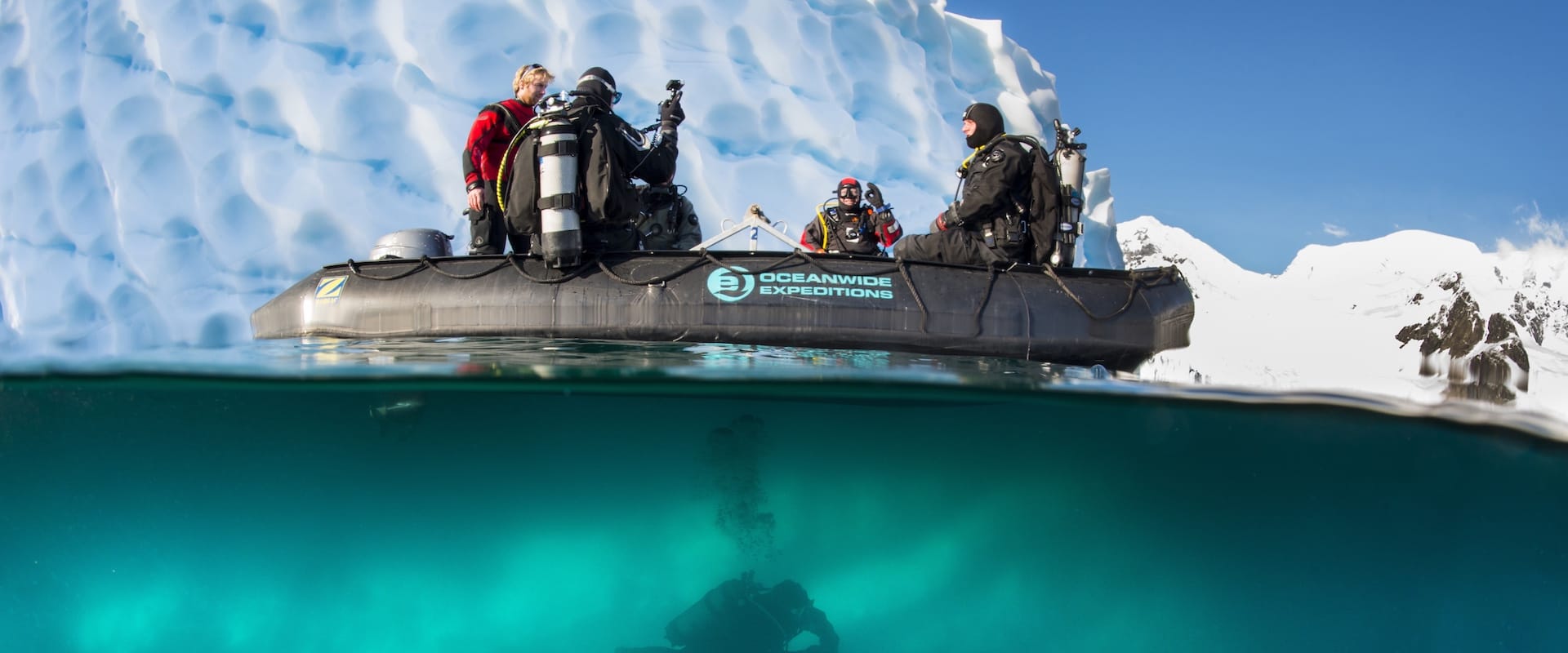Liveaboard Diving in Antarctica
A chance to dive with playful penguins among underwater ice formations.
Liveaboards in Antarctica are a fantastic way to fully experience and appreciate the magical icy splendour of one of the world’s remotest and lesser-visited areas. Offering incredible polar diving for experienced cold water divers, you can expect to see an array of captivating wildlife as well as spectacular underwater ice formations and dazzlingly bright blues as the sunlight hits the water.
You can also join in with varied other activities.Antarctica is not governed by any individual country. Rather, many countries have asserted territorial claims and set up research bases in the area. Under international law, Antarctica is owned by nobody, and can only be used for peaceful purposes, with most activities in the area being research or tourism.
Despite the huge distance between the two places, the first nation to try and claim parts of Antarctica was the United Kingdom. The first UK vessel traveled to the area in the early 1800s. Extreme weather conditions meant, however, that no country tried to set up a colony in the region. Indeed, there are no permanent settlements in Antarctica still to this day.
Staying on a luxury liveaboard in Antarctica means that you can enjoy marvelous polar diving, soak up splendid unique views, and explore a true icy wilderness that is rich with fascinating wildlife. Return to your cozy cabin every night and reach places that would not be possible without spending nights at sea.
Liveaboard Dive Trips In Antarctica
The marine life that you may spot in the area includes whales, seals, and penguins, in addition to diverse birds and, of course, plentiful aquatic life. Creatures that live in the watery world include various species of fish, crabs, jellyfish, and starfish. Krill is especially abundant and, as a major food source, attracts other creatures to the area. Antarctic liveaboard cruises are perfect for fans of underwater photography.
Whether you prefer exciting ice diving, diving from a smaller vessel (zodiac boat), or diving from beaches, an Antarctica expedition cruise offers different diving experiences. You can also enjoy diving along walls.
If you want a diverse vacation, a liveaboard cruise in Antarctica is ideal. Other activities available on the various itineraries typically include kayaking, hiking, land excursions, and zodiac boat rides. You may have the opportunity to visit research stations on your polar adventure and might be able to see abandoned and disused bases. You will also be taken to some of the most scenic spots, including majestic icebergs and areas with the best opportunities for getting up close and personal with intriguing wildlife. The birdlife is especially captivating.
Dive trips here are usually combined with other activities and available for varying durations. Most itineraries are for around ten nights, though you can spend up to 20 nights on a spectacular and adventure-filled liveaboard dive cruise.
Dive Sites & Areas of Antarctica
The diverse islands, channels, and expanses of water of Antarctica offer thrilling experiences for all.
The remote Falkland Islands offer excellent bird-watching opportunities, cultural experiences, and the chance to see stranded ships. South Georgia has varied terrains and wildlife. Points of interest include Ernest Shackleton’s grave, beautiful bays, and the Whaling History Museum.
Other islands that you may visit on your polar adventure include Avian Island, with its many birds, and Pourquoi Pas Island, famous for its spectacular fjords and glaciers; the Melchior Islands, Deception Island; and the South Shetland Islands. Detaille Island, Petermann Island, the South Orkney Islands, and the Fish Islands are even more. Beautiful waterways include the Beagle Channel and the Drake Passage, whilst the Weddell Sea and the Ross Sea will also enchant you.
The Antarctic Peninsula offers an unparalleled underwater adventure. Surrounded by dramatic icebergs and under the watchful eyes of curious marine wildlife, including seals, penguins, and a variety of whale species, divers are treated to a once-in-a-lifetime experience amidst the untouched beauty of the Antarctic's underwater ecosystems.
When To Go
The best time to visit Antarctica is between November and March. December and January see the warmest temperatures and most sunlight and are popular times for an expedition to the Antarctic region. The surface temperature of the water is typically about zero degrees Celsius (32 degrees Fahrenheit).
Wildlife sightings depend on the exact month you visit. November is the penguin mating season. Come December, penguin eggs will begin to hatch, and sightings of baby penguins are common in December and January. These are also great months for seeing young seals being cared for by their mothers. If seeing whales is high on your agenda, plan your diving trip to Antarctica for between February and March. The end of the season is also a good time for diving, with clear waters and not-so-cold conditions.
Tips For Travellers
You will need to have prior experience of diving in cold conditions to partake in scuba diving in Antarctica on a liveaboard cruise. You will also need to ensure that you take suitable gear for diving in cold conditions. Your kit list should include a dry diving suit with a hood (or attachable hood), gloves, boots, a stabilizing jacket, a mask, and a weight belt. Other equipment includes a compass, knife, underwater torch, thermal underwear, an underwater computer, watch, or gauge.
You should also pack clothes that are suitable for cold conditions for your time out of the water. Plan to dress in layers and take spare items in case some get wet or you are a lot colder than you anticipated. A windproof jacket can help to combat icy winds. Sun cream is also essential. Keep in mind that the weather can change very quickly in Antarctica.
An underwater camera, a regular camera with a zoom lens, and binoculars can enhance your wildlife viewing and capture memories from your trip.
English is widely spoken around Antarctica, though with no official language, you may also hear Spanish, German, French, Russian, Swedish, Norwegian, and more. Spanish is the primary language in the main departure point of Ushuaia.
You should take Argentine pesos to use before and after your cruise. Other useful currencies around Antarctica include USD, GBP, and EUR; most major currencies will be accepted.
Concerning electrical devices, Argentina uses plug types C and I (round two-pin and angled three-pin). The electricity is between 220 and 240 volts AC.
How To Get There & Ports Of Departure
Argentina’s Ushuaia is the most common departure point for dive holidays to Antarctica. Liveaboard trips also return to the same port. The local airport is called Malvinas Argentinas Ushuaia International Airport (USH). You can fly to Ushuaia from various places around Argentina. Additionally, flights operate in and out of Ushuaia from (and to) a network of airports around South and North America, with a handful of services to Europe as well.
Considerations
Only experienced divers can take part in scuba diving from an Antarctica cruise. While all dives are led by experienced members of the team, keep in mind that medical and emergency assistance in this remote region of the world can be a fair distance away. There are no decompression facilities in the area. People are recommended to have completed a minimum of 30 dives, including those in cold conditions.
An influenza vaccine is essential. A pneumococcal vaccine is recommended, especially for those who are prone to respiratory complaints. Travelers should ensure that all “standard” vaccines are also up to date, such as typhoid, tetanus, and diphtheria.
Liveaboard prices are typically around 750 USD per person per night on a once-in-a-lifetime Antarctica voyage. There are, though, of course, more luxurious sailings available that will cost more and itineraries that cater to those with a more modest budget. Additional fees may apply for optional activities, attractions, and excursions.
Book your next liveaboard adventure cruise to Antarctica today.











